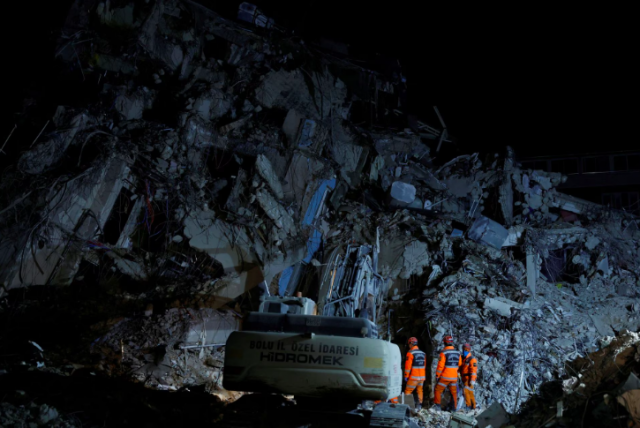Turkey's Antakya turns into a ghost city after third quake
Trucks, emergency vehicles and excavators lined the desolate streets of the city after its third major earthquake

Trucks, emergency vehicles and excavators lined the desolate streets of Turkey's Antakya Tuesday night, after the third major earthquake in two weeks accelerated an exodus from the once-lively city.
In the pitch-black streets, passing headlights revealed mounds of rubble, frames of broken windows, and entangled rebar. Red and blue flashing lights from military and police vehicles reflected off the jagged facades of slanted buildings.
The sound of excavators clawing out debris echoed through the streets as police, soldiers and disaster responders looked on, clustered around small fires dotting the cracked sidewalks. Occasionally, the digging would stop for emergency workers to inspect for possible bodies.
"Everyone is gone," said Mehmet Ay, a 50-year-old survivor of the quakes who has been living in Antakya his entire life, and is one of the few residents who have remained.
"They have either died or have fled."
From a distance, the sharp cityscape of what used to be tall buildings now appeared crenulated. Chunks of the riverbanks were collapsed into the water, while soldiers blocked off damaged bridges.
Billboards were smashed into the ground and the scattered signage among the rubble stood as reminders of the shops that used to fill the busy streets.
"Our streets used to be paradise," said Ay. "In a single night, everything was destroyed."
Ay was sheltering with his wife Fatmeh and their daughter in one of the camps set up to provide temporary shelter to those who lost their homes. A generator roared over the chatter of people gathered around wood stoves outside their tents.
"We can't leave the camp," he said. "It's difficult to walk around because it's dangerous anywhere you go. The buildings are dangerous. Before you know it, a structure can collapse on you."
Earlier, as the sun set over a square next to the city hall, soldiers, volunteers and survivors lined up at food trucks and service stations for dinner and tea.
At a roundabout, a statue of modern Turkey's founder Mustafa Kemal Ataturk on a rearing horse was still standing. Just below it, a marble plaque with his famous quote on Hatay province becoming part of Turkey lay shattered on the ground.
"The disaster fell on all of us," said Saleem Fawakirji, a 57-year-old dishwasher who has been living in Antakya for 12 years after fleeing Syria. "The rich and poor alike," added his wife, Walaa.
The couple, their two daughters and a son survived the Feb. 6 quake by crawling out of a small crack in the rubble. Their eldest son didn't make it.
Fawakirji said the family had no plans to abandon the deserted city. "Look how God granted all of us another life except for my son. Why take the risk now?" he said.
Ay also said he planned to remain.
"It will take a long time, it will take years - but we will rebuild it," said Ay, a construction worker.
"God willing, it will be better than it used to be."



















COMMENTS
Comments are moderated and generally will be posted if they are on-topic and not abusive.
For more information, please see our Comments FAQ